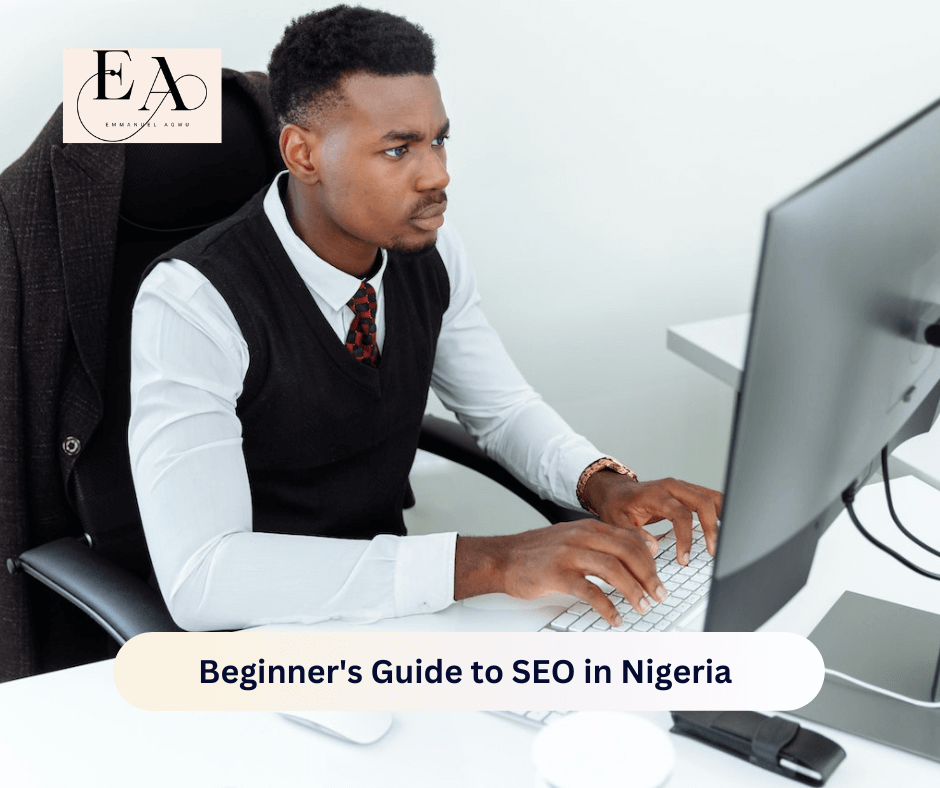In today’s digital age, where every business strives to stand out from the crowd, mastering the art of Search Engine Optimization (SEO) has become a non-negotiable necessity along with content writing. Whether you’re an aspiring entrepreneur, a seasoned marketer, or a curious enthusiast, this comprehensive guide is your passport to unlocking the secrets of SEO success tailored specifically for Nigeria.
From the bustling streets of Lagos to the vibrant markets of Abuja and beyond, Nigeria’s online landscape presents a world of untapped potential. With over 100 million internet users and a rapidly growing digital ecosystem, the time to harness the power of SEO in Nigeria is now. So, fasten your seatbelts and get ready to embark on a thrilling journey where we’ll unravel the intricacies of SEO strategies, local insights, and actionable tips to conquer search engine rankings, attract targeted traffic, and propel your online presence to soaring heights.
Whether you’re an e-commerce entrepreneur looking to boost sales, a blogger aiming to reach a wider audience, or a local business striving for increased visibility, this guide is tailored to address the unique challenges and opportunities you’ll encounter in Nigeria’s diverse online landscape. From keyword optimization and content marketing to technical SEO and link building, we’ll equip you with the knowledge and tools you need to navigate the intricacies of SEO in Nigeria with confidence and finesse.
So, let’s embark on this SEO journey together!
What is Search Engine Optimization (SEO)?
SEO, which stands for Search Engine Optimization, is a practice and set of techniques aimed at improving a website’s visibility and ranking in search engine results pages (SERPs). The goal of SEO is to increase organic (non-paid) traffic to a website by optimizing various elements both on and off the website.
Search engines, such as Google, use complex algorithms to determine the relevancy and authority of web pages in response to a user’s search query. SEO involves optimizing a website’s content, structure, and other factors to align with these algorithms and improve its chances of ranking higher in search results.
At its core, SEO focuses on understanding how search engines work and what users are searching for. By aligning a website’s content and structure with user intent and search engine guidelines, SEO aims to attract targeted traffic and provide valuable information or solutions to users.
Successful SEO implementation can result in increased organic traffic, higher visibility, improved user experience, and ultimately, higher conversions or sales. It requires ongoing monitoring, adaptation to algorithm changes, and staying up to date with industry trends to maintain a competitive edge in search engine rankings.
Why is SEO Important?
SEO is crucial for several reasons, as it plays a fundamental role in the success of a website and its online presence. Here are some key reasons why SEO is important:
1. Increased Organic Traffic:
Organic search is often the primary source of website traffic. By optimizing your website for search engines, you can attract more organic traffic from users actively searching for information, products, or services related to your website.
2. Improved Visibility and Brand Exposure:
Higher search engine rankings result in increased visibility for your website. When your website appears on the first page of search results, it gains more exposure to potential visitors, leading to brand recognition and trust.
3. Trust and Credibility:
Websites that rank higher in search results are perceived as more trustworthy and authoritative by users. By implementing SEO best practices and providing valuable, relevant content, you can establish your website as a credible source within your industry or niche.
4. Better User Experience:
SEO is not only about optimizing for search engines but also about enhancing the user experience. A well-structured, user-friendly website with relevant content and easy navigation satisfies both search engine algorithms and visitors, leading to longer on-site engagement and lower bounce rates.
5. Targeted Traffic and Higher Conversion Rates:
SEO helps target users who are actively searching for what your website offers. By aligning your website’s content with user intent and optimizing for relevant keywords, you can attract highly targeted traffic that is more likely to convert into leads or customers.
6. Cost-Effective Marketing Strategy:
Compared to paid advertising, SEO provides a cost-effective long-term marketing strategy. While it requires time and effort to implement, the results of SEO can be sustainable and generate ongoing organic traffic without incurring direct advertising costs.
7. Competitive Advantage:
In today’s digital landscape, SEO is a competitive necessity. If your competitors are investing in SEO and you are not, you risk losing market share and visibility. By staying ahead or on par with your competitors in search rankings, you can maintain a competitive edge and reach your target audience effectively.
8. Adaptability and Long-Term Results:
SEO is adaptable to changes in search engine algorithms and user behaviour. While algorithm updates may require adjustments to your SEO strategy, the foundation of SEO principles remains constant. By investing in SEO, you are building a solid foundation for long-term online visibility and sustainable results.
Step By Step Beginner’s Guide to SEO in Nigeria
Now, let’s walk you through the step-by-step guide on how to perform SEO in Nigeria, highlighting the key activities:
1. Keyword Research and Optimization:
Keyword optimization involves researching and strategically incorporating relevant keywords into your website’s content to improve its visibility in search engine rankings. Keyword research simply refers to the process of finding the right keywords your target audience searches for so you can offer answers through your content. To perform keyword optimization effectively, follow these steps:
a. Perform keyword research:
Use keyword research tools to identify keywords related to your content or business that have a good search volume and manageable competition. Make use of important tools like Ahrefs, Keywords Everywhere, Semrush and more.
b. Select target keywords:
Choose specific keywords that align with user intent and are relevant to your content. Consider long-tail keywords, which are more specific and have lower competition.
c. Incorporate keywords naturally:
Integrate your target keywords into your website’s content, including headings, paragraphs, image alt tags, and meta tags. However, avoid overstuffing keywords, as it can negatively impact user experience and search engine rankings.
2. Technical SEO:
Technical SEO focuses on optimizing the technical aspects of your website to improve its crawlability, indexability, and overall performance. Here’s how you can perform technical SEO activities:
a. Ensure website accessibility:
Make sure search engines can crawl and index your website’s pages by removing any barriers like broken links, excessive redirects, or blocked resources.
b. Optimize website speed:
Improve page loading times by optimizing image sizes, minimizing code, enabling browser caching, and utilizing content delivery networks (CDNs). Google’s Page Speed Insights tool makes this process simpler and faster.
c. Implement XML sitemaps:
Create and submit XML sitemaps to search engines to help them understand your website’s structure and index your pages more effectively. XML site maps is a great tool for this.
d. Use structured data markup:
Implement structured data markup (such as Schema.org) to provide additional information about your content to search engines, enhancing the visibility of rich snippets in search results.
3. Content Marketing:
Content marketing involves creating and promoting valuable, relevant, and engaging content to attract and retain your target audience. To excel in content marketing:
a. Understand your target audience:
Research your audience’s needs, interests, and pain points to create content that resonates with them.
b. Develop a content strategy:
Plan your content creation and distribution, including blog posts, articles, videos, infographics, or podcasts. Focus on quality, originality, and providing value.
c. Optimize content for SEO:
Incorporate relevant keywords naturally into your content, optimize headings and meta descriptions, and ensure your content is well-structured and easy to read.
d. Promote your content:
Share your content on social media platforms, engage with your audience, participate in relevant communities, and collaborate with influencers or industry websites to amplify its reach.
4. On-Page SEO:
On-page SEO refers to optimizing elements within your web pages to improve their visibility and relevancy. Here’s how you can perform on-page SEO:
a. Optimize meta tags and title tags:
Craft compelling and concise meta descriptions and title tags that include relevant keywords and entice users to click on your website in search results.
b. Structure content with headings:
Use proper heading tags (H1, H2, etc.) to organize your content and signal its hierarchy to search engines.
c. Improve URL structure:
Create descriptive and user-friendly URLs that include target keywords, making it easier for both users and search engines to understand the page’s topic.
d. Optimize image attributes:
Use descriptive alt tags for images, including relevant keywords, to help search engines understand the content and improve accessibility.
5. Duplicate Content:
Duplicate content refers to identical or highly similar content appearing on multiple web pages. To address duplicate content issues:
a. Identify duplicate content:
Use tools like Copyscape or Google Search Console to identify duplicate content within your website or across the web.
b. Consolidate duplicate content:
Merge or redirect duplicate pages to a single authoritative page to consolidate link equity and avoid confusion for search engines.
c. Use canonical tags:
Implement canonical tags to specify the preferred version of duplicate content, signalling search engines which page to index and rank.
6. Meta Tags and Title Tags:
Meta tags and title tags are HTML elements that provide information about a web page to search engines. Here’s how you can optimize them:
a. Meta tags:
Craft unique and descriptive meta tags for each page, including a relevant meta description that entices users to click on your website in search results. Include target keywords naturally but avoid keyword stuffing.
b. Title tags:
Create concise and compelling title tags that accurately reflect the content of each page. Place important keywords towards the beginning of the title tag.
7. Off-Page SEO:
Off-page SEO involves activities performed outside of your website to improve its visibility and authority. Here’s how you can perform off-page SEO:
a. Link building:
Earn high-quality backlinks from reputable websites by creating valuable content, reaching out to influencers or industry publications, or guest posting on relevant blogs. Focus on quality over quantity, as authoritative links can positively impact your website’s rankings.
b. Social media engagement:
Build a strong social media presence and engage with your audience by sharing your content, participating in discussions, and fostering relationships with influencers.
c. Online reputation management:
Monitor and manage your online reputation by actively responding to customer reviews, addressing feedback, and maintaining a positive brand image.
How do I start learning SEO for beginners?
Here’s the approach I took to kick-starting my SEO adventure:
- Understand Search Engines and Their Algorithms
- Keyword Research and Analysis
- On-Page Optimization
- Technical SEO
- Link Building:
- Analytics and Measurement:
- Stay Updated and Adapt
What should I learn first in SEO?
Keyword research is the crucial first step on your SEO journey, especially when starting a new website. It provides a valuable overview of the sub-topics that capture the interest of people in your niche or industry.
Final Thoughts
By implementing these SEO activities, you can improve your website’s visibility, attract targeted traffic, and enhance your online presence. As you embark on your SEO journey, it’s important to establish a strong foundation by learning the essential elements of SEO. Understand search engines and their algorithms, conduct effective keyword research, optimize on-page elements, master technical SEO, embrace ethical link building, and learn how to analyze and measure your SEO efforts. Remember to stay updated with industry changes and continuously refine your strategies. With a solid understanding of these core components, you’ll be well-equipped to navigate the exciting world of SEO and drive organic traffic to your website.

